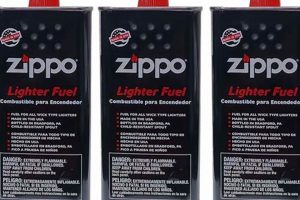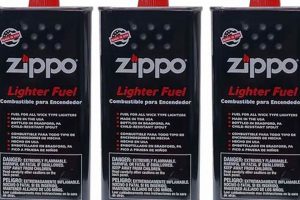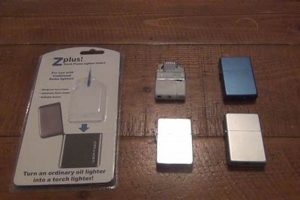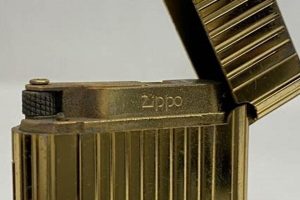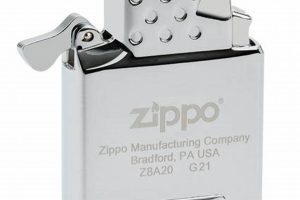Zippo lighters are iconic for their windproof design and use of a specialized lighter fluid. While refillable, they are designed specifically for naphtha-based fuels. Attempting to fill a Zippo with butane, typically used in many other lighter designs, is not recommended. Butane and naphtha have different chemical properties and require distinct storage and ignition systems.
Using the correct fuel ensures the lighter’s intended functionality and longevity. Zippo’s design incorporates a wick, packing material, and flint wheel optimized for naphtha’s properties. Using butane can lead to malfunctions, leaks, and potentially damage the lighter’s internal components. The historical significance and enduring popularity of the Zippo lighter are linked to its reliable performance with its dedicated fuel. Maintaining this performance requires adhering to the manufacturer’s recommendations.
The following sections will delve deeper into the specific reasons behind this incompatibility, exploring the differences between butane and naphtha, the mechanics of a Zippo lighter, and the potential risks associated with using the incorrect fuel. Further information will be provided on proper Zippo maintenance and fuel recommendations.
Tips for Proper Zippo Lighter Fuel Usage
Maintaining optimal performance and longevity for a Zippo lighter necessitates adherence to proper fueling procedures and fuel selection. The following tips provide guidance for ensuring the lighter functions as intended and remains a reliable tool.
Tip 1: Use Only Zippo Premium Lighter Fluid. This specialized naphtha-based fuel is formulated specifically for Zippo lighters, ensuring consistent performance and minimizing the risk of damage.
Tip 2: Avoid Butane and Other Fuels. Butane, propane, and other fuels not specifically designed for Zippo lighters can damage internal components and create safety hazards.
Tip 3: Fill the Lighter Correctly. Remove the insert from the case and lift the felt pad to expose the cotton packing. Saturate the packing with fuel, avoiding overfilling. Allow excess fuel to evaporate before reassembling the lighter.
Tip 4: Store Fuel Safely. Store lighter fluid in a cool, dry place away from open flames and heat sources. Ensure the container is properly sealed to prevent evaporation and leaks.
Tip 5: Dispose of Empty Fuel Containers Responsibly. Follow local regulations for the proper disposal of empty lighter fluid containers.
Tip 6: Regularly Inspect the Lighter for Leaks. Periodically check the lighter for any signs of fuel leakage, especially around the filling port and seams. Address any leaks promptly to prevent safety hazards.
Tip 7: Clean the Lighter Periodically. Remove the insert and gently clean the exterior surfaces with a soft cloth. Avoid using harsh chemicals or abrasive materials.
Adhering to these guidelines will ensure the longevity and reliability of a Zippo lighter, allowing it to function optimally for years to come.
By understanding the specific requirements of a Zippo lighter and using the correct fuel, users can appreciate the enduring quality and performance of this classic design.
1. Fuel Incompatibility
Fuel incompatibility is central to understanding why butane should not be used in a Zippo lighter. These lighters are engineered for a specific type of fuel, and deviating from this can lead to various issues. This section explores the core facets of this incompatibility.
- Chemical Properties:
Butane and naphtha (Zippo’s recommended fuel) possess distinct chemical properties influencing their combustion characteristics. Naphtha, a mixture of hydrocarbons, vaporizes and ignites at a lower temperature than butane. Zippo’s wick, packing material, and chimney are optimized for naphtha’s specific properties. Introducing butane disrupts this delicate balance, potentially leading to incomplete combustion, excessive residue buildup, and an altered flame.
- Vapor Pressure:
Butane has a higher vapor pressure than naphtha. This difference is critical because Zippo lighters rely on atmospheric pressure to regulate fuel flow. Butane’s higher vapor pressure can cause oversaturation of the wick, leading to flooding, leakage, and difficulty extinguishing the flame. The lighter may also become overly sensitive to temperature changes, affecting its reliability.
- Seals and Materials:
Zippo lighters utilize specific seals and materials designed for naphtha’s properties. Butane can degrade these materials over time, leading to leaks and malfunctions. The seals, intended to contain naphtha, may not be compatible with butane’s chemical composition, increasing the risk of fuel escaping and posing a fire hazard.
- Ignition System:
The flint wheel and striking mechanism of a Zippo lighter are calibrated for naphtha’s ignition characteristics. Butane’s different ignition temperature may cause inconsistent sparking and difficulty lighting the lighter reliably. This incompatibility can also cause excessive wear on the flint and other components.
In summary, the incompatibility between butane and Zippo lighters stems from fundamental differences in their chemical properties, vapor pressures, and the materials used in the lighter’s construction. Attempting to use butane compromises the lighter’s performance, longevity, and safety. Adhering to the manufacturer’s recommendation of using Zippo premium lighter fluid ensures optimal functionality and mitigates potential risks.
2. Design Differences
Design differences between butane and Zippo lighters play a crucial role in understanding why using butane in a Zippo is inadvisable. Zippo lighters are specifically engineered for naphtha fuel, and their design reflects this specialization. Key design elements, including the wick, chimney, and fuel storage system, are optimized for naphtha’s properties. Butane lighters, conversely, employ distinct designs tailored to butane’s characteristics, particularly its higher vapor pressure. For instance, butane lighters often incorporate pressurized fuel reservoirs and adjustable valves to control fuel flow, features absent in Zippo lighters.
The wick in a Zippo lighter is designed to absorb and regulate the flow of naphtha, which has a lower viscosity than butane. Using butane can oversaturate the wick, leading to flooding, leakage, and difficulty extinguishing the flame. The chimney’s dimensions and ventilation are also calibrated for naphtha’s combustion properties, ensuring a consistent flame in various wind conditions. Introducing butane can disrupt this carefully balanced system, resulting in an unstable or inefficient flame. Furthermore, Zippo’s fuel storage relies on absorbent packing material, unlike the sealed, pressurized tanks found in butane lighters. This packing material is specifically designed to hold naphtha and regulate its evaporation. Butane’s higher vapor pressure can overwhelm this system, leading to leaks and potential safety hazards.
In summary, the design discrepancies between butane and Zippo lighters underscore the importance of using the correct fuel. Attempting to use butane in a Zippo lighter ignores these fundamental design differences, potentially compromising the lighter’s functionality, safety, and lifespan. Recognizing these design considerations reinforces the manufacturer’s recommendation to use only Zippo premium lighter fluid.
3. Safety Hazards
Attempting to use butane in a Zippo lighter presents several safety risks. These hazards arise from the incompatibility between butane and the lighter’s design, potentially leading to malfunctions, leaks, and fires. Understanding these risks is crucial for promoting safe lighter handling practices.
- Uncontrolled Fuel Release:
Butane’s higher vapor pressure, compared to naphtha, can cause excessive pressure buildup within a Zippo lighter not designed for such pressures. This can lead to uncontrolled fuel release through leaks around the filling port, seams, or wick. Such leaks pose a significant fire hazard, especially in the presence of an ignition source.
- Malfunction and Fire:
Using butane can disrupt the Zippo’s intended operation. The interaction of butane with the lighter’s components can lead to malfunctions such as unpredictable flames, difficulty extinguishing, and even internal fires within the lighter casing. These malfunctions pose a risk of burns and property damage.
- Material Degradation:
Butane’s chemical properties can degrade the seals and internal components of a Zippo lighter, designed for naphtha. This degradation can weaken the lighter’s structural integrity, increasing the likelihood of fuel leaks and malfunctions over time, exacerbating the risks of fire and injury.
- Explosions:
While less common, attempting to modify a Zippo lighter to accommodate butane, such as by altering the fuel storage system, can create extremely dangerous conditions. Incorrect modifications combined with butane’s flammability can lead to explosions, causing severe injury and property damage.
These safety hazards underscore the importance of using only the recommended fuel Zippo premium lighter fluid in a Zippo lighter. Disregarding this advice elevates the risk of accidents, potentially leading to serious consequences. Proper fuel selection and adherence to manufacturer guidelines are essential for safe and responsible lighter use.
4. Performance Issues
Employing butane in a Zippo lighter inevitably leads to performance issues. These problems stem from the fundamental incompatibility between the fuel and the lighter’s design. The lighter’s components, including the wick, chimney, and ignition system, are calibrated for naphtha’s specific properties. Introducing butane disrupts this delicate balance, resulting in a range of malfunctions.
One common issue is inconsistent flame height. Butane’s higher vapor pressure can lead to erratic fuel flow, causing the flame to sputter or flare unpredictably. This makes the lighter unreliable for its intended uses, such as lighting cigarettes or starting fires. Another frequent problem is difficulty igniting. The flint and wheel mechanism in a Zippo is optimized for naphtha’s ignition temperature. Butane’s different ignition characteristics can result in frequent misfires, requiring multiple strikes to produce a flame. Furthermore, using butane can lead to excessive fuel leakage. The seals and packing material in a Zippo are designed to contain naphtha, not butane. Butane’s higher volatility can cause it to evaporate more readily, leading to leaks and fuel waste. This not only compromises the lighter’s functionality but also poses a safety hazard.
In conclusion, using butane in a Zippo lighter directly results in diminished performance, characterized by inconsistent flames, ignition difficulties, and fuel leakage. These issues highlight the importance of using the correct fuelZippo premium lighter fluidto maintain the lighter’s intended functionality and prevent potential hazards. Attempting to circumvent this compatibility requirement inevitably compromises the lighter’s reliability and longevity. The observed performance issues serve as a practical demonstration of the fuel-design synergy inherent in a Zippo lighter.
5. Warranty Voidance
Zippo lighters are renowned for their durability and lifetime guarantee. However, this guarantee is contingent upon using the product as intended, which includes using the correct fuel. Using butane in a Zippo lighter directly impacts the warranty, potentially voiding it entirely. This section explores the relationship between using butane and warranty voidance.
- Terms of Service:
Zippo’s warranty explicitly states that damage caused by using fuels other than Zippo premium lighter fluid is not covered. This stipulation protects the company from liability for damage resulting from misuse of the product. Attempting to claim warranty service for a malfunction caused by butane usage will likely be rejected, leaving the owner responsible for repair or replacement costs.
- Evidence of Misuse:
Residue from butane combustion differs from that of naphtha. Authorized repair technicians can readily identify signs of butane use within the lighter. This evidence provides grounds for denying warranty claims, even if the damage isn’t directly attributed to the butane. The presence of butane residue effectively demonstrates a breach of the warranty terms.
- Loss of Consumer Protection:
Voiding the warranty removes the consumer protections afforded by the guarantee. This leaves the owner solely responsible for any repairs or replacements necessitated by butane-related damage. The financial burden of repairs or replacement falls entirely on the consumer, negating the benefits of the lifetime guarantee.
- Prevention and Proper Use:
Adhering to the manufacturer’s guidelines regarding fuel use is crucial for maintaining warranty coverage. Using only Zippo premium lighter fluid ensures the lighter functions as intended and protects the consumer’s investment. Understanding and following these guidelines prevents unnecessary complications and maintains the long-term value of the lighter.
In conclusion, using butane in a Zippo lighter jeopardizes the warranty, potentially voiding it entirely. This nullifies the lifetime guarantee, leaving the consumer responsible for any subsequent repair costs. Adhering to manufacturer recommendations regarding fuel usage is essential for maintaining the warranty’s validity and ensuring the longevity of the lighter. Respecting these guidelines protects the consumer’s investment and guarantees the continued performance and reliability of the Zippo lighter.
6. Manufacturer Recommendations
Manufacturer recommendations regarding fuel usage in Zippo lighters are not arbitrary; they are rooted in the engineering and design of the product. These recommendations directly address the question of whether butane can be used in a Zippo lighter. The unequivocal answer, based on these recommendations, is no. This guidance stems from the specific compatibility of Zippo lighters with naphtha-based fuels, like Zippo Premium Lighter Fluid, and the inherent incompatibility with butane. Ignoring these recommendations can lead to a cascade of negative consequences, affecting the lighter’s performance, safety, and longevity.
Zippo’s official website and product literature explicitly advise against using butane. This guidance reflects the company’s understanding of the potential risks and performance issues associated with using an incompatible fuel. For example, the website clearly states that using anything other than Zippo Premium Lighter Fluid can damage the lighter and void the warranty. This information is readily available to consumers, emphasizing the importance of adhering to these recommendations. Real-world examples abound of users experiencing problems after using butane, from leaky seals and malfunctioning ignition systems to dangerous flare-ups and even small explosions. These instances demonstrate the practical significance of respecting manufacturer recommendations.
Understanding the connection between manufacturer recommendations and fuel choice is crucial for responsible Zippo lighter ownership. Disregarding these recommendations not only compromises the lighter’s functionality but also introduces potential safety hazards. The manufacturer’s expertise in the design and engineering of the product provides the foundation for these recommendations. Respecting this expertise ensures the optimal performance, safety, and lifespan of the lighter, while ignoring it risks damage, malfunction, and potential injury. Ultimately, adhering to manufacturer recommendations reflects a commitment to safe and responsible product use.
Frequently Asked Questions
This section addresses common inquiries regarding the use of butane in Zippo lighters, providing clear and concise answers based on manufacturer recommendations and established technical understanding.
Question 1: What type of fuel is recommended for Zippo lighters?
Zippo recommends using only Zippo Premium Lighter Fluid, a specifically formulated naphtha-based fuel.
Question 2: Can butane be used as a substitute for Zippo Premium Lighter Fluid?
No, using butane in a Zippo lighter is strongly discouraged due to incompatibility with the lighter’s design and potential safety hazards.
Question 3: What are the potential consequences of using butane in a Zippo lighter?
Using butane can lead to malfunctions, leaks, reduced performance, fire hazards, and voiding of the lifetime warranty.
Question 4: Why are Zippo lighters not compatible with butane?
Zippo lighters are engineered for naphtha’s specific properties, including its vapor pressure, ignition temperature, and interaction with the lighter’s components. Butane’s different characteristics make it incompatible with this design.
Question 5: What should be done if butane is accidentally used in a Zippo lighter?
The lighter should be emptied immediately, thoroughly cleaned with a soft cloth, and refilled with Zippo Premium Lighter Fluid. If any malfunctions persist, contact Zippo for repair guidance.
Question 6: Where can one find reliable information regarding proper Zippo lighter fuel usage?
Consult the official Zippo website or authorized retailers for accurate and up-to-date information on fuel recommendations and usage guidelines.
Adhering to manufacturer recommendations ensures optimal performance and longevity of the Zippo lighter. Using the correct fuel is crucial for safe and reliable operation.
The subsequent section will discuss proper Zippo lighter maintenance procedures for ensuring continued reliable performance.
Can I Use Butane in a Zippo? A Definitive Answer
Compatibility between fuel and lighter design is paramount for safe and optimal functionality. Exploration of this topic has revealed the inherent incompatibility of butane with Zippo lighters. These lighters are meticulously engineered for naphtha-based fuels, exemplified by Zippo Premium Lighter Fluid. Attempting to use butane introduces significant risks, including malfunctions, fuel leaks, diminished performance, and potential fire hazards. Furthermore, such usage voids the manufacturer’s warranty, negating the long-term benefits associated with Zippo ownership. Design differences between butane and naphtha lighters underscore this incompatibility. Zippo’s wick, chimney, and fuel storage system are calibrated specifically for naphtha’s properties, while butane’s distinct characteristics disrupt this delicate balance. Manufacturer recommendations emphasize the exclusive use of Zippo Premium Lighter Fluid for optimal performance and safety.
Maintaining the integrity and longevity of a Zippo lighter hinges on respecting its design parameters and adhering to manufacturer guidelines. Appropriate fuel selection is not merely a suggestion but a critical factor in ensuring safe and reliable operation. Continued reliance on informed practices safeguards both the lighter’s functionality and the user’s well-being. Ultimately, responsible ownership involves recognizing the inherent limitations of a product and prioritizing safe usage above experimentation with incompatible fuels. Understanding this principle ensures the enduring legacy of the Zippo lighter as a reliable and iconic tool.


